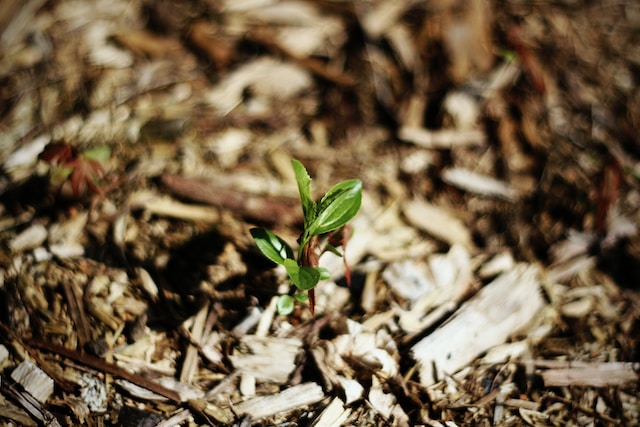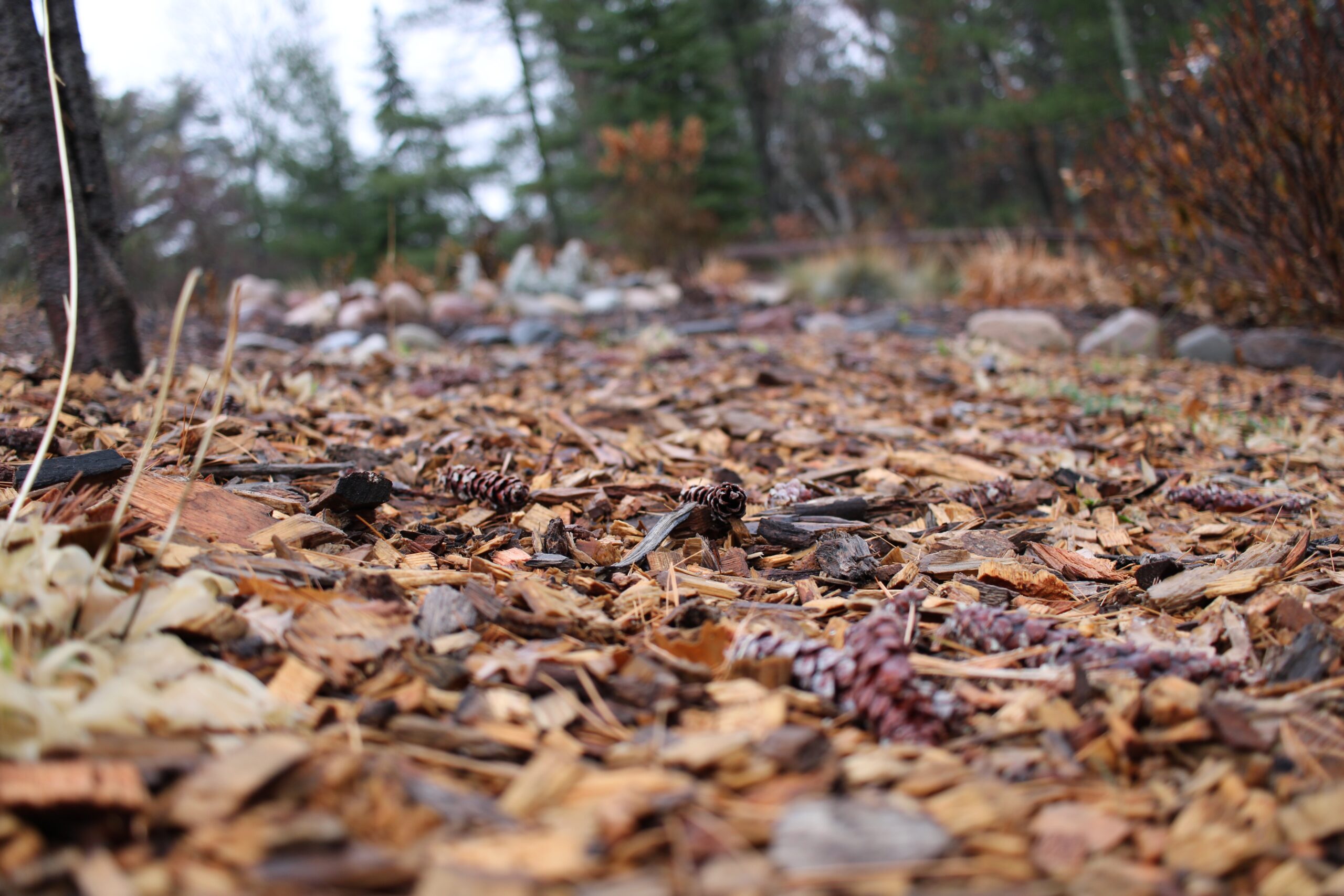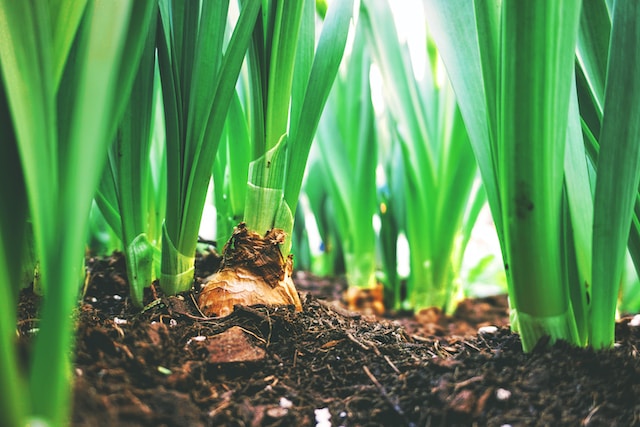The Benefits of Organic Garden Mulch
Organic garden mulch has become increasingly popular in recent years, and with good reason. It provides numerous benefits to gardens, such as suppressing weeds, maintaining soil moisture, and controlling soil temperature.
When gardening, it is important to use a good organic garden mulch to keep your plants happy and healthy. Garden mulch is important for several reasons:
- Garden mulch helps keep the soil temperature more even and cooler in the summer months, taking stress off of your plant’s roots.
- Garden mulch keeps the moisture in the soil from evaporating so quickly requiring you to water less during dry spells.
- Garden mulch is great for suppressing weeds. A good 3″ to 4″ application of organic garden mulch will greatly reduce your need to weed!
- Finally, organic garden mulch breaks down over time adding nutrients to your plant beds.

What Is Mulching and Its Types?
Mulching is the practice of applying a protective layer of organic material, such as leaves, bark, pine needles, or wood chips to the soil surface.
Mulch helps protect plants from extreme temperatures and drought, suppresses weed growth and fungal diseases, retains moisture in the soil and feeds beneficial microorganisms.
Organic garden mulches are made from natural materials like wood chips, straw, pine needles, and bark.
These materials are not only environmentally friendly but they also help to add nutrients to the soil as they decompose. This makes them ideal for organic gardening practices.
Based on their texture and composition, organic mulches can be divided into three types: coarse, medium, and fine.
- Coarse mulches are made from wood chips or bark. They help to keep the soil temperature more even and cooler in the summer months while also keeping moisture from evaporating too quickly.
- Medium-textured mulches like straw or pine needles are ideal for suppressing weed growth.
- Fine mulches like compost or manure help to break down over time and add nutrients to the soil.
Organic garden mulch is an essential part of many gardens, providing a number of benefits that will help your plants thrive.
With its ability to reduce weeds, increase moisture retention and add essential nutrients to the soil, organic garden mulch is an important part of any gardener’s toolkit.
Benefits of Organic Mulching
Organic mulching has several benefits for your garden, including:
- Better water retention in the soil
- Improved nutrient content of the soil
- Prevention of weed growth
- Suppression of fungal diseases and pests
- Temperature regulation in extreme climates
- Organic matter added to the soil as it breaks down over time
Organic mulching also helps to reduce the amount of work you need to do in your garden. Weeds are suppressed, and with the added organic matter, the soil will become more fertile over time.
This means less fertilization is required, reducing costs and labor for the gardener, as well as helping to reduce the environmental impact of gardening.
Organic garden mulch can also help to reduce erosion on slopes and prevent soil compaction from foot traffic and other activities. For example, a layer of bark mulch on pathways can help to minimize compaction from heavy foot traffic.
Disadvantages of Organic Mulching
There are some disadvantages to organic mulching, such as increased pest activity. Organic materials provide a breeding ground for insects and other pests.
If you choose to use an organic garden mulch, it is important to monitor your plants regularly for any signs of insect damage or disease. One of the most common pests associated with organic mulch is the slugs and snails that thrive in damp conditions.
Organic mulches can also attract animals such as rodents, rabbits, dogs, or cats who may be attracted to the food source. In addition, organic mulches are prone to mold and fungal growth in wet climates.
These issues can usually be mitigated by ensuring the mulch is applied correctly and monitoring plants regularly.
Organic mulches can also increase the risk of soil compaction if not applied properly. Over-mulching can prevent air and water from reaching the plant roots, resulting in a decrease in growth.
Finally, organic materials tend to break down over time and may need to be replaced more frequently than inorganic mulches. This can result in additional costs for the gardener, especially if the mulch needs to be replaced annually.
Overall, these are the benefits and disadvantages of organic garden mulch. Depending on your needs and climate, you may want to weigh the pros and cons before deciding what type of mulch to use in your garden.
Avoid Inorganic Garden Mulch
If you have never heard about inorganic mulch, you are probably wondering what it is. Inorganic mulch is basically any type of mulch made from synthetic materials such as plastic or rubber.
These types of garden mulches are not organic and offer no benefit to the soil or plants in your garden. They also do not break down over time and may need to be replaced more often than organic mulches.
In addition, some inorganic mulches can release toxins into the soil, potentially harming your plants and the environment. For these reasons, it is best to avoid using inorganic garden mulch whenever possible.
Inorganic garden mulches are not as beneficial to your garden as organic mulches. Several reason why inorganic mulches are typically a poor choice include:
- Inorganic mulches tend to retain heat, which can be hard on your plant’s roots, especially in the summer months.
- Inorganic mulches often require some sort of landscape fabric or barrier to keep the mulch from being pressed into the soil. These barriers tend to “seal” your plant beds and reduce the amount of oxygen that gets to your plants.
- Finally, inorganic mulches don’t break down over time, which means they offer no nutrient value to your plants.
Although inorganic mulches may seem like a good option at first, they are usually not the best choice for your garden! So, if you are looking for a mulch option, be sure to opt for an organic mulch to get the best benefits for your plants and soil.

Recycling as a Sustainable Solution
When thinking about what type of organic material to use for mulching, consider recycling materials that would otherwise be discarded.
For instance, leaves from your yard or shredded newspaper are great options for organic mulch and don’t require additional resources to produce. Not only is this an environmentally-friendly option, but it can also save you money in the long run!
In addition, the use of compost as a garden mulch is an excellent way to recycle kitchen scraps and other organic materials. Compost breaks down over time, adding nutrients to the soil as it does so.
Finally, consider using wood chips or bark from sustainable sources such as local tree trimming companies or sawmills that source their wood sustainably.
This helps to reduce the environmental impact of mulching while still providing all the benefits of organic garden mulch.
How to Pick The Right Organic Mulch
When selecting an organic mulch for your garden, there are a few things to consider. First, consider the climate in which you live and how it might affect the type of mulch you choose.
For instance, wood chips may not be the best choice if you live in a wet or humid area as they can rot quickly. On the other hand, bark mulches can help retain heat and work well in dry climates.
In addition, consider the size of your garden and any potential issues with pests or animals. If you have a large area to cover, shredded wood may be more cost effective than small bark pieces.
It’s also important to consider how much maintenance the mulch will require. Compost, for example, may require more frequent replacement than other types of organic mulches.
Finally, make sure to select an organic mulch that suits the plants you are growing. For instance, some mulches may be too acidic for acid-loving plants such as rhododendrons and azaleas.
Based on all these criteria and your individual needs, you can determine the best type of organic mulch for your garden. By taking the time to select an organic mulch that meets your needs, you can maximize its benefits and create a thriving garden!
Some Good Choices for Organic Garden Mulch
Your garden will benefit the most from organic garden mulch. Here are a few for your to consider:
- Compost is a great garden mulch. It is full of nutrients and will be a great amendment to your soil.
- Bark mulches are another common organic garden mulch. There are all types of bark mulches. There are large nuggets, small nuggets; however, shredded bark mulch works very well. A layer of 3″ to 4″ will work well at keeping your soil moist and the weeds to a minimum.
- Cocoa mulch is another good organic garden mulch, and it smells great as well. Do not use cocoa mulch if you have pets because it can be harmful to them. Dogs are especially attracted to cocoa mulch, and if ingested, it can cause diarrhea, vomiting and seizures.
Garden mulch is a very important ingredient of a successful garden. Keep your plants happy and healthy by keeping them covered in a wonderful blanket of organic garden mulch.
To learn more about the benefits of mulching, you may want to visit the United States Department of Agriculture website. Here, you can find more information about the types of mulches and how they can help your garden.

Frequently Asked Questions
As you consider the use of organic garden mulch, here are some common questions to help get you started:
Q: Is organic mulch worth it?
A: Yes, organic mulch is definitely worth it. Organic mulches provide a range of benefits such as improving soil structure and fertility, regulating temperature, suppressing weeds, and reducing erosion.
Q: What is the best type of organic garden mulch?
A: The best type of organic garden mulch depends on your individual needs and the plants in your garden. Some good options include compost, bark mulches, wood chips, and cocoa mulch.
Q: Is mulch the same as compost?
A: No, mulch and compost are different. Mulch is applied around plants to protect them from extreme temperatures and conserve soil moisture. Compost is a type of organic matter that can be added to the soil as an amendment. It helps improve soil fertility and structure while providing nutrients for plants.
Q: What are the benefits of using bark mulch in a vegetable garden?
A: Bark mulch helps to regulate soil temperature, suppress weeds, and reduce erosion. It also adds organic matter to the soil, which can improve nutrient availability.
Additionally, it helps conserve moisture in the soil and provides a habitat for beneficial organisms like earthworms. These benefits make bark mulch an excellent choice for vegetable gardens!
Q: Whats the best mulch material for a vegetable garden?
A: The best mulch material for a vegetable garden depends on your individual needs and the plants in your garden.
enerally speaking, bark mulch or compost is a good choice as it helps to retain moisture and suppress weeds. It can also add organic matter to the soil, which can improve nutrient availability.
Additionally, straw mulches are great for vegetable gardens as they help keep fruits and vegetables off the ground, reducing the risk of disease.
In order to find the best mulch material for your vegetable garden, it’s important to consider your individual needs and the plants in your garden. Taking the time to select an organic mulch that meets these criteria can help you get the most out of your vegetable garden!
Q: What are benefits of using mulch instead of soil?
A: Using mulch instead of soil offers several benefits. Mulch deters weeds, helps regulate temperature, and conserves moisture in the soil. It also adds organic matter to the soil, which can improve its fertility and structure over time.
Ultimately, mulches provide a great way to protect your plants while still allowing them to receive the nutrients they need for growth!
Q: Is hay the best type of mulch for your garden?
A: Hay is a popular choice for mulching gardens, but it’s not always the best option. While hay does provide some benefits such as suppressing weeds and improving soil structure, it can also add too much nitrogen to the soil.
Hay can introduce unwanted pests like slugs or insects into your garden. If you do opt for hay, be sure to use it sparingly and to supplement with other mulches such as wood chips or bark.
Q: Are fallen leaves good for mulch?
A: Yes, fallen leaves are a great source of mulch for your garden. Leaves provide natural insulation and help the soil stay moist. They also add organic matter to the soil which helps improve its texture and fertility.
When using leaves as mulch, be sure to rake them up before they get too wet or compacted. Additionally, you may want to supplement with other mulches such as compost or bark to ensure the soil receives the nutrients it needs.
Q: How often should I replace my mulch?
A: The frequency of mulch replacement depends on your individual needs and the type of mulch you’re using. Generally speaking, it’s a good idea to add a new layer of organic mulch once or twice per year.
This will help keep weeds at bay and provide your plants with essential nutrients. In addition, organic mulches tend to break down over time, and replacing them periodically will help ensure that your soil stays healthy and your plants stay happy!